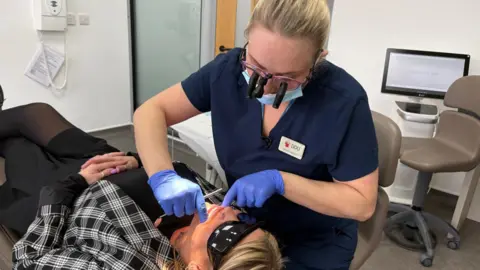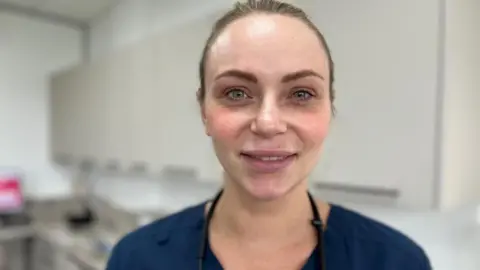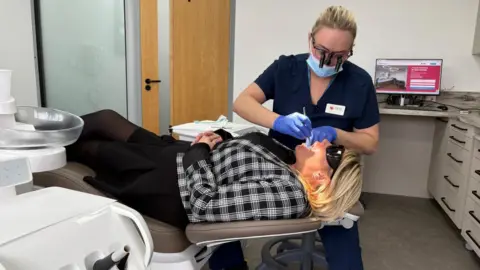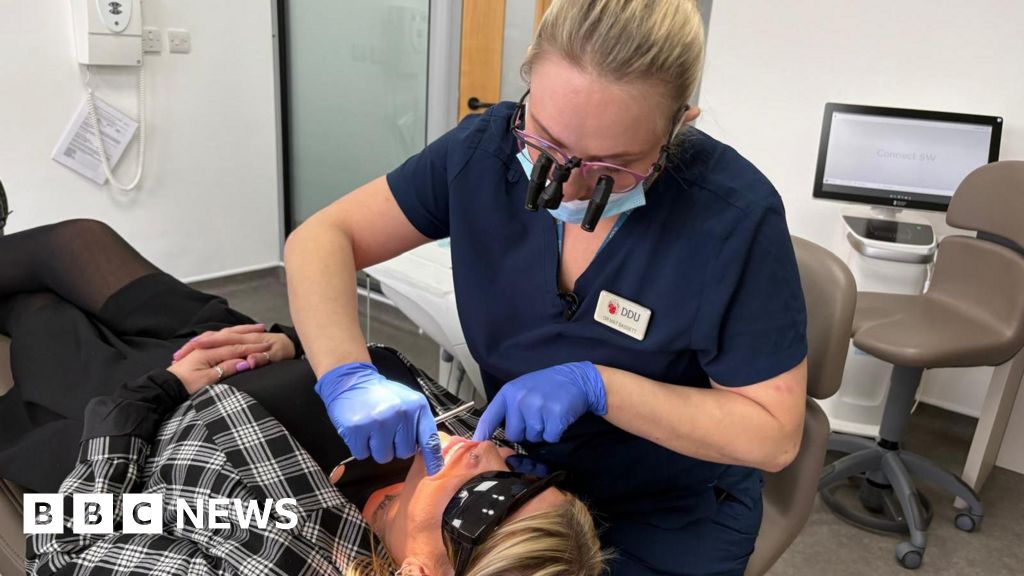Jenny ReesWales health correspondent
 BBC
BBC
Dr May Bassett said NHS dentistry had shifted to mainly extracting teeth because patients were not seen frequently enough to prevent decay
NHS Wales dentists will no longer see patients routinely twice a year, with gaps of up to two years between regular check-ups for those with healthy teeth.
But plans that would have seen NHS patients allocated a dentist for each check-up rather than staying with a single practice have been dropped.
Under new proposals, the Welsh government said those needing treatment would be seen more regularly, but dentists argue reducing the frequency of NHS check-ups will create “a social divide”.
The British Dental Association (BDA) Cymru acknowledged “some important wins” in the policy shift, but raised concerns longer recall times would limit the ability to spot early signs of disease.
Initial proposals outlined by the Welsh government in June would have created a centralised waiting list for adult dental care, with appointments for check-ups allocated on a rolling basis, anywhere within a patient’s health board area.
Any follow-up treatments would have been done in the same surgery, with patients returning to the central register thereafter.
Under the refreshed policy, which comes into effect in April 2026, patients with no apparent dental issues could be recalled by dentists every 18 to 24 months, in line with the maximum interval set out by NICE guidelines.
Practices would receive a fixed amount to support ongoing care for healthy patients, rather than payments per visit.
However, BDA Cymru said longer recall times could limit their ability to flag any potential oral issues, including oral cancer, and would mean they were unable to advise patients on the best course of action before it was too late.
“We work a lot on an emergency care basis now,” said Dr May Bassett, a dentist based in Abercynon, Rhondda Cynon Taf.
She said previously, when NHS patients were seen more frequently, there was the opportunity to screen for signs of early tooth decay, and other potential problems, but nowadays, many patients turn up with teeth “beyond the point of repair”.
“We’re getting to a point where it’s no longer an option to treat with fillings or root canal. It tends to be going towards an extraction-only service,” she said.

Dr May Bassett says she is concerned the lack of availability of care is creating a social divide
Dr Bassett said some patients only managed to see an NHS dentist when there was an emergency, and they were already in intense pain.
She explained more complex solutions, such as root canals, had to be done via a series of appointments, and since “second-stage” appointments cannot be offered in emergency clinics, patients often opted for the tooth to be removed.
But extraction can lead to “repercussions on general health”, said Dr Bassett, especially where there is limited oversight by health professionals.
“It’s going to create a social divide, where people who can afford to keep their teeth healthy will have good teeth,” she said.
“People who can’t afford it will have poor oral health, and subsequently poor general health as a result.
“It seems like a final nail in the coffin for NHS dentistry.”
‘Impossible workload’
Dr Bassett said she previously worked solely in the NHS, but now does a mix of NHS and private dentistry, after training in orthodontic and aesthetic dentistry.
Dental practices are privately owned, rather than being funded by the NHS, and many rely on private income to sustain their business.
“The amount of patients you’ve got to see in the time you’re given within the NHS – it’s an impossible workload to sustain,” she said.
The most recent NHS contract paid dentists per patient, regardless of how much or little work each patient required.
“A lot of people are making a loss on their NHS work currently,” said Dr Bassett. “If that changes and the losses become worse, you’re looking at a mass exodus from the NHS.”
Under the planned changes by the Welsh government, general fee rates to NHS dentists will rise from the proposed £135 to £150.
Patients who pay for NHS treatment will pay half the costs – capped at a maximum £384, regardless of how much care they need.
The Welsh government said about half the Welsh population was exempt from paying NHS dental charges, including children under 18, pregnant women, hospital dental patients and people receiving certain benefits.

Responding to the policy changes, the BDA said “plastering over a few of the biggest cracks is just superficial repairs”, adding the true cost of dental care was not reflected.
“We need to see the small print,” said Russell Gidney, chairman of the BDA’s Welsh General Dental Practice Committee, who highlighted potential pitfalls in the legislative process.
“Ministers are taking forward the biggest changes NHS dentistry in Wales has ever seen via a route that will all but rule out fixes once draft laws reach the Senedd,” said Mr Gidney.
“The Welsh government must ensure real threats to this service don’t make the final cut of their plans.”
Additional reporting by Lola Mayor


